11+ Sample Outsourcing Contracts
-
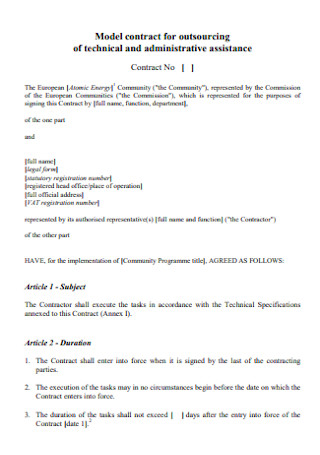
Model Contract for Outsourcing
download now -
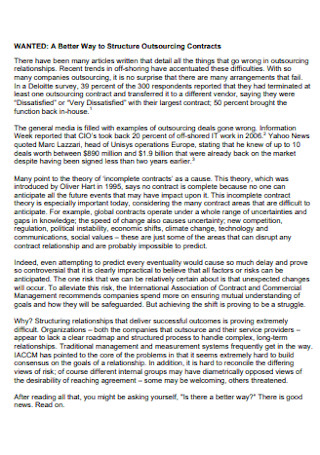
Structure Outsourcing Contract
download now -
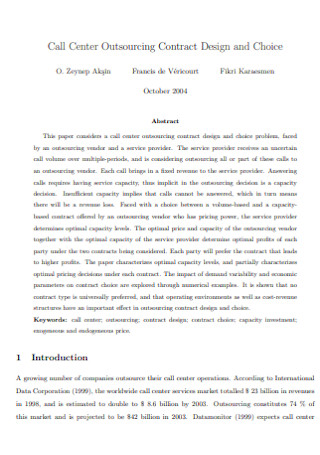
Call Center Outsourcing Contract
download now -
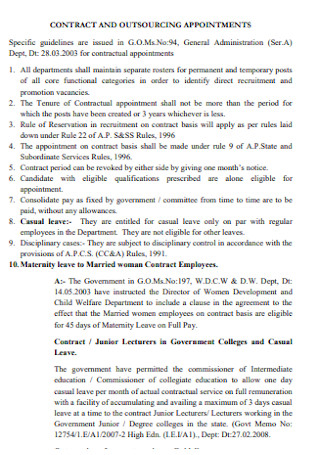
Contract and Outsourcing Appointment
download now -
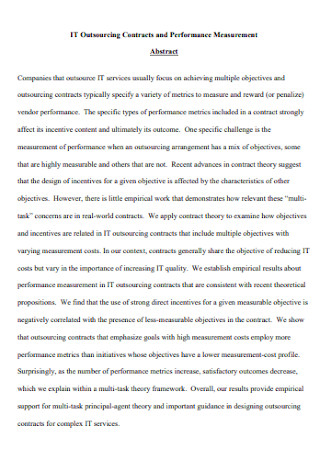
IT Outsourcing Contract Template
download now -
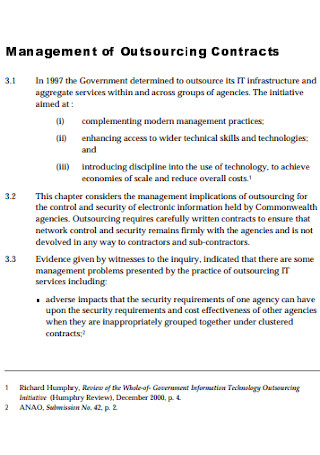
Management of Outsourcing Contract
download now -
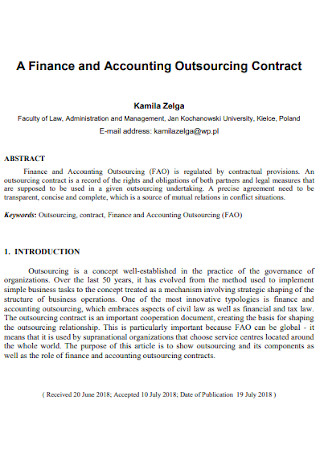
Accounting Outsourcing Contract
download now -
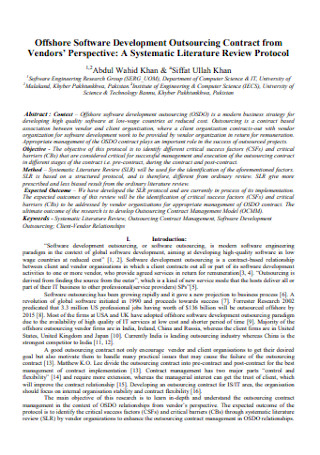
Software Development Outsourcing Contract
download now -
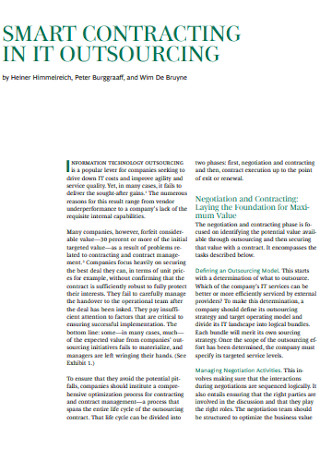
IT Outsourcing Contract
download now -
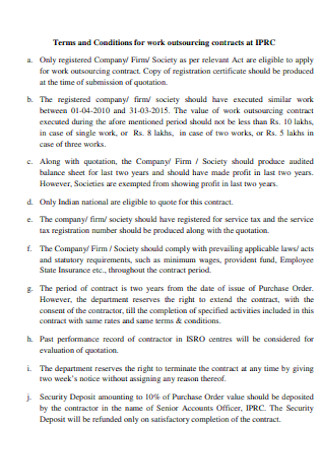
Work Outsourcing Contract
download now -
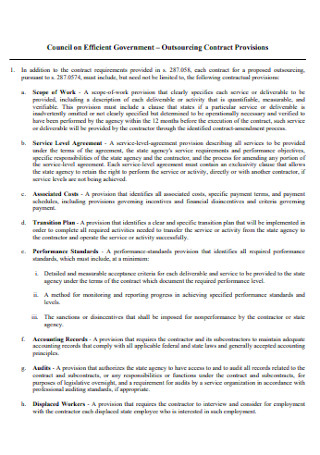
Outsourcing Contract Provisions
download now -
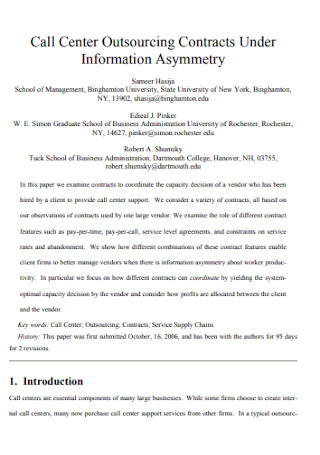
Sample Call Center Outsourcing Contract
download now
FREE Outsourcing Contract s to Download
11+ Sample Outsourcing Contracts
What Is an Outsourcing Contract?
Components of an Outsourcing Contract
How To Draft an Outsourcing Contract
FAQs
What are the three types of outsourcing contracts?
What are examples of outsourcing?
What is the difference between contracts and outsourcing?
In transacting with other companies to provide your manufacturing and service production, it is advisable to have a legal document that holds all the necessary information regarding the two companies’ relationship. An outsourcing contract helps organizations set up a working relationship under law. What is an outsourcing contract, and what advantages does it present to participating businesses? The article below presents the definition, composition, and construction of these documents. Read on to find out more, including answers to frequently asked questions.
What Is an Outsourcing Contract?
In its simplest definition, an outsourcing contract is a form of legal documentation between two parties that contains specific details about the terms and conditions of the hiring party and what it expects from the outsourcing company. The contract protects the business owners from unfavorable situations that can stem during its duration. The agreement is binding as the two parties sign for an outsourcing project or partnership. Aside from the work expectations, it also indicates information and details about quality control parameters, project timeline, merchandise pricing, additional rewards, among other things. The outsourcing contract also contains statutory provisions and statements, including intellectual property clauses, non-disclosure agreements, and many others. It serves as a guide for the professional connection by both parties that both benefit their businesses.
According to the data published by the Statista Research Department in February 2021 regarding the global outsourcing market size, an accumulation amounting to 92.5 billion US dollars came from the global outsourcing market. From 2000 to 2019, the revenue of the outsourcing market has been fluctuating.
Components of an Outsourcing Contract
Before learning to draft an outsourcing contract, it is necessary to familiarize yourself with its essential components. Depending on the type of outsourcing contract you intend to create, you must understand the terms, conditions, and provisions it must contain. Read through the section below to grasps the essential components you need for a well-written outsourcing contract.
How To Draft an Outsourcing Contract
Outsourcing contracts must define and cover every aspect of the business relationship and anticipate situations and circumstances. Constructing these agreements must involve management going through several consultations, meetings, research, and revisions before finalizing and producing the document. Below are the steps you must take to draft a comprehensive outsourcing contract.
Step 1: Define the Scope of Outsourced Week
Defining the scope of work is the most basic step and the main purpose of producing an outsourcing contract. Guarantee that the document contains customer support services, service levels or business targets, work schedules, agreed deliverables, and business owner’s tasks. The scope of work determines the parties’ responsibilities and expectations to avoid misunderstandings and disagreements. Ensure tasks descriptions are specific and accurate for reference.
Step 2: Seek Legal Advice From Experts
When offshoring, it is best to review local policies, laws, regulations, and provisions that can affect the business. It is also wise to consult with legal practitioners, like licensed attorneys familiar with existing deals similar to the contract you are drafting. The step ensures accounting for all related provisions.
Step 3: Go For the Win-Win Situation
The construction of contracts emphasizes treating each party fairly. During the drafting of the contract, ensure that both parties under the contract win. Instead of thinking about personal gains, it is necessary to think about long-term sustainability instead. Remember that the best contracts stress equal amounts of compromise and flexibility, subject to necessary revisions.
Step 4: Agree On Penalties, Benefits, or Rewards
High-quality performance and achieving exceptional performance levels equate to benefits and rewards. These are additional incentives for motivating people to continue producing peak quality performance. If there are incentives, there must be necessary penalties set for failing to satisfy standards, including security issues, contract breaches, and poor performance.
Step 5: Planning the Finality of the Deal
It is necessary to plan for a contract’s termination. Planning all depends on the conditions of the business relationship set by the two parties. Compose a detailed exit plan for both parties to get information in coping with consequential results or changes easily, especially if the termination is abrupt.
FAQs
What are the three types of outsourcing contracts?
Outsourcing contracts are prevalent in various businesses, and it is critical to make use of the agreement that suits your business project. The three types of outsourcing contracts include time and material outsourcing contracts, fixed price outsourcing contracts, and dedicated team outsourcing contracts.
What are examples of outsourcing?
Outsourcing activities include human resource management, facilities management, accounting, customer support and services, content writing, legal documentation, among others.
What is the difference between contracts and outsourcing?
A contract is a binding agreement enforceable under the law that exists between two or more parties. Outsourcing is the transfer of tasks to an outside entity through an agreement of the two parties, usually to reduce production costs.
Outsourcing is a helpful tactic to lessen the company’s production costs. Aside from lessening labor rates, it also produces benefits, including increased efficiency and flexibility, access to innovation, and increased focus on core competencies. Before drafting your outsourcing contract, you must take the time to consult legal entities to cover the necessary provisions and sections of the document. It is always advantageous to gain knowledge from experts instead of doing everything on your own. The article also provides outsourcing contract samples you can use and download for your outsourcing needs, but remember to seek professional help before signing these legal documents.
